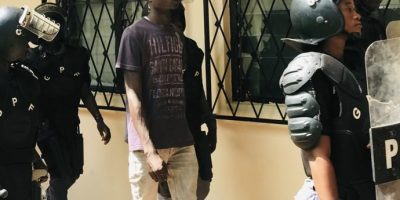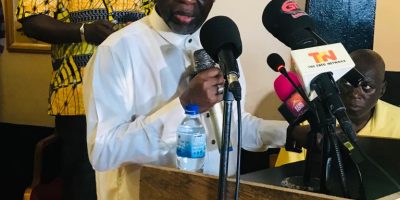 By Dr. Assan Jallow
By Dr. Assan Jallow
“We should not expect individuals to produce good, open-minded, truth-seeking reasoning, particularly when self-interest o reputational concerns are in play. This is why it is so important to have intellectual and ideological diversity within any group or institution whose goal is to find truth (such as an intelligence agency or a community of scientists) or to produce good public policy (such as a legislature or advisory board).”
– Jonathan Haidt
- Introduction
The novel coronavirus outbreak has become a global pandemic with millions of people affected. According to global statistics, more than 5.01 million people worldwide have contracted the coronavirus, with 1.91 million cases of recoveries and 329, 000 confirmed death cases (New York Times, 2020). This is an alarming figure to be scary as the virus does not know national borders, race/tribe/ethnicity, gender, sexual orientation, region, or nationality. The pandemic has negatively impacted the global supply chain as it has both health and economic ramifications on national economies and, by extension, the global economy at large. The virus remains a mystery, and nations are actively conducting research studies to unravel this apocalypse taking a deadly toll on human lives. Currently, pharmaceutical companies are making inroad progress in the quest to discover a scientifically-proven cure.
Of recent, several countries in Asia and Europe, where the COVID-19 outbreak appears to have peaked, are gradually reopening their economies (IMF, 2020).On the domestic front, The Gambia government has announced an extended lockdown on the economy for another 21 days. President Barrow preceded that in declaring a ‘State of Emergency’ based on the powers conferred to him by section 34 (1), (a) of the 1997 constitution of the Gambia. In this case, President Barrow has written himself the same letter that Cardinal Richelieu, the 17th-century French Statesman, purportedly gave to his agents: “The Bearer of This Letter Has Acted Under my Orders and for the Good of the State.” Undoubtedly, invoking the public emergency powers is the economic equivalent of burning witches or sacrificing virgins to appease angry viral gods. Granted, politicians have no liability for the economic damage they inflict; they have no incentive to minimize the disruptions they decree. If these Asian and European countries have considered the need for reopening their economies, so why not the resource-constraint Gambia? I know there is the possibility of the virus spiking up if the necessary measures recommended by the World Health Organization (WHO) and that of the Ministry of Health (MoH) are not strictly followed or adhered to by the people.
However, our situation has not to turn dire to resort to additional national lockdown based on the number of people infected with the virus. 22 – 24 positive cases cannot be a justifiable reason for shutting down the economy, thus risking the lives and livelihood of people to hang in the aisle of uncertainty and worst-off. The chances of the number rising to approximately 180,000 people to be affected are slim as the tabulated data are based on hypotheses and statistical probability on the error of margin, thus factoring our closely knitted communities and absence or loosening of enforcement measures.
From health management and prevention perspectives, lockdowns are precautionary measures. It is a necessary evil to help stem the spread of the virus. Health is wealth, but in a country with the worst healthcare delivery system where preventable deaths are more pronounced than any other nation on earth playing politics with the virus and using guerrilla policies to draw sympathy from the developed economies for funds that are being abused and not used for their intended purposes. The questions we must ask ourselves is: Does the Gambian economy need to remain in a lockdown mode. In contrast, the government does not have any definite fallback plans of any possible financial bailout intervention support mechanism to smoothen the ramifications of its actions on businesses, lives, and livelihoods of the citizens? Indeed, no! Lockdown is a designed mechanism with well-crafted strategies to address the consequences of possible economic stagnation with the necessary support and not to be used to increase food poverty further or create inequality with economic imbalances in an economy. Sadly, our lockdown is not fit for purpose as it has disrupted economic activities with numerous devasting domino effects on the health, education, agriculture sectors with the negative impacts of increasing the geography of poverty and caging the people in the pool of having to fend for themselves or risked scavenging for food to survive as destitution looms high across zones and regions.
- Discussion on the Effects of the Lockdown
Is the economy stupid? This is hypothetical, and I guess not, but those running the economy seem to have been overwhelmed by the pandemic to the extent of not reasoning within the science of economics and responsible leadership in managing a virus. The effects of the lockdown seem to by far outweigh that of the virus itself. Currently, the Gambia faces an unemployment crisis of 35.2% (UNDP, 2020). GDP percentage growth will plummet to a negative 8-12%, while unemployment will further increase from 35.2 to 35.9 %, and food poverty will also significantly increase.
Moreover, expectations were that the government of the Gambia was going to allow economic activities to resume following the 45 days national lockdown, with more easing options of sustainable recovery of the economy to rebound. That has not been the case for The Gambia on COVID-19 pandemic. The government instead came up with a further extension of no definite strategic plans, actions, and mitigation strategies for the need of an additional 45 days, thus, increasing the burden of frustrations to the 48.6 percent of the population that lives below the poverty line. One would have thought that the government would have given advanced reasons with antecedents regarding the designed guidelines and the containment strategies to be implemented, and how to open the economy in stages based on geographic regions and zones, rather than using the political stick of banking on external funds for support.
Based on data, labor productivity has decimated to a staggering record low percentage point with a performance at below 40%. Though, this has been the trend since independence, thus affecting talents, innovations and creativity, and intellectual disposition in the public sector. Employees’ performance and productivity in the public sector are not as effective when compared to private-sector institutions’ employees’ output. Unfortunately, the writer does not have the data on the effects on labor productivity in the Gambia. However, the writer is of the clear view that the per day and week cost of the lockdown is higher than what the government of the Gambia had previously estimated, announced, and presented before deputies at the National Assembly (NA), international organizations such as the World Bank (WB), International Monetary Fund (IMF), the European Union (EU),
Undoubtedly, corruption and bribery will increase in the public sector as many will use their offices, position of power, and authority as a financial recovery base, after post-COVID-19.
As can be observed, the economic cost of social distancing without stricter enforcements will surge higher than expected, thus impacting significantly negatively on people’s health as compared to physical interactions. labor productivity with
- Reasons for Supporting the Reopening of The Gambian Economy
GDP is a principal measure a national economy uses to access economic impact on growth and development. There are several reasons why I am in support of the reopening of the Gambian economy. These are:
- The government of The Gambia, in her request for support to UNDP Policy Brief (March 2020), stated that “the possibility of lockdown might lead to increased problems as many Gambian households are ill-prepared for self-isolation/staying at home. Most people live their lives through daily earnings, so a total lockdown may not be as effective as it is in most developed countries. A measure the government can consider would be to declare a state of emergency and instill a curfew, which would allow people to conduct business and protect their livelihood, albeit with caution.” This was the position of the government of The Gambia and the very reason why the Gambia does not need an extended public state of emergency in this material time, amidst the frustrating challenges facing the people during the initial lockdown.
- The economy of the Gambia is pruned to external shocks and lacks the pedestals of resilience to rebound with a steady growth if the engines of its development parameters are weakened and subsumed by exogenous factors. To end the contraction of the economy and avoid economic growth stalling, given the low productivity on economic activities for a resource-constraint like the Gambia that entirely depends on budget support with no manufacturing industries, reopening the economy is a non-negotiable agenda that must not be politicized. This is critical and has the benefits of helping the economy to recover and respond to the demand shock caused by the pandemic.
- There is the absence of workable plans and fiscal measures to offset the economic losses caused by the lockdown on businesses and individuals (i.e., employees and self-employed) in the form of income support or relief from the government to stimulate the economy due to the fragile fiscal imbalances in the economy. Further extension on the state of emergency will make it practically impossible for the Gambian economy to rebound successfully on sustainable growth.
- The absence of mapping out strategies and risk-profiling of what will trigger a spike, how to contain the virus, and how to reopen the economy is a bane in our political leadership and governance infrastructure. South Africa is the worst affected country in Africa, with more than 2,500 confirmed cases offers a strategic roadmap for reopening of their economy based on a percentage basis. This is designed on mathematical stimulation and that, on average, if the infection rates rise to 90 percent per day, an extension will be implemented, and if less than that number, may open the door to an easing of restrictions. That is a clear roadmap of reopening based on the facts and figures of science, and not sliding on the wagon as a pointer with no actionable decisions.
- There is no logic to further extend the sweeping powers of the President on public emergency. Our situation has not turned dire to resort to additional national lockdown based on the number of people infected with the virus. 22 – 24 positive cases cannot be a justifiable reason for closing the economy, thus risking lives and livelihood, and making people hang in the aisle of uncertainty. The logic for an extended national lockdown should be informed based on whether there is an increase or decrease in several infection cases. The chances of the number rising to approximately 180,000 people to be affected are slim as the tabulated data are based on hypotheses and probability, thus factoring our closely knitted communities and absence of enforcement.
- The extended lockdown will only benefit the public sector and private sector employees, and not the self-employed or self-owned businesses. For the public and private sector employees, they will still be receiving their monthly emoluments, despite having to put lesser hours at work. But, for the self-employed, not opening meaning not selling or money coming in, but rather money coming out of their pockets hence risked not having an income, having to sit at home with the concept of “Yallah Bakhna” in the Wolof parlance (meaning, God is Great)
- Recommendations
The COVID-19 pandemic has placed the Gambia in a very frustrating and distressing fiscal position, amidst a weakened currency and on the heels of a higher borrowing cost for government, banks, and businesses. Therefore, the government of the Gambia must pursue holistic monetary and fiscal responses that will have a real impact on lives and livelihoods, and business, and not resorting to the use of conservation politics of expressing concerns of sympathy, while failing to take actions and end the devastating sufferings of the people and the impact the pandemic have on lives and livelihoods.
- Established benchmarks on the proposed stimulus package of easing up the financial losses of companies/business during the pandemic
- Partially easing up the lockdown by maintaining stricter border closure with adequate protection, and surveillance to deter the movement of people across our national borders with the Republic of Senegal through contact-tracing and creating a sustainable ring-fencing strategy that will deter any possible community transmission, given the fact that we live in closely knitted communities.
- Encouraging and ensuring the full adherence to the WHO’s guidelines in flattening the curve against the COVID-19 pandemic
- The government of The Gambia should pilot science and technology as a critical flagship on its development agenda to direct innovation and automation on the government’s business and processes. This will enable paperless transactions, e-government communications, and e-learning much more accessible than what the people, students, and businesses are currently witnessing, following the outbreak of the novel coronavirus pandemic. Our education system regarding delivery has been tested, and many poor and disadvantaged rural children were unable to exploit the internet like their more fortunate peers. It has increased the cost of education for parents as schools have to resort to online discussions and lessons, and the impact has not yielded any substantial benefits regarding the pedagogy as the digital divide was more pronounced. This is an area the government must consider investing resources to build up the necessary structures on technology development.
- Conclusion
The economic cost is rising faster than the COVID-19 cases in the Gambia, and the lack of income support from the government to those negatively impacted by the pandemic is creating impatience and worrying concerns. The government of The Gambia under the leadership of President Adama Barrow must reason with economic realities and act responsibly based on issue-based policies with a more pragmatic value-chain mechanism and actions to prioritize what is best for the economy and citizens rather than hanging in the wilderness and expecting windfalls from the goodwill of international organization as a fallback strategy to rebound the economy on post-COVID-19. Times like these require the government of The Gambia to take hard decisions by allowing economic activities to continue while pursuing and monitoring the guidelines of the WHO.
To summarize, the Gambian COVID-19 case does not necessitate an extended public emergency. There are no spikes of any potential or alarming exponential threat to public health. Concerted efforts and cautious actions need to be taken to flatten the curve through a more proactive and coordinated program of education and sensitization on social distancing and the strict usage of personal masks in public places. Therefore, the coronavirus pandemic behooves the citizens to be ambassadors of health by adhering to the WHO’s guidelines and, more importantly, keeping themselves safe, and at least six feet apart from anyone they do not share the same household, thus, limiting visitations and public gatherings, especially places of worship, and public transportation. Based on the advanced reasoning, the writer suggests that the government of The Gambia should review the science of lockdown based on prevailing economic realities and not on the politics of outstretching hands for bailouts and goodwill.
References
IMF Blogs. (2020). Emerging from the Great Lockdown in Asia and Europe
Retrieved from https://blogs.imf.org/2020/05/12/emerging-from-the-great-lockdown-in-asia-and-europe/
New York Times (2020, 21 May). Tally of Reported Coronavirus Cases Exceeds 5 Million Worldwide: Live Coverage
Retrieved from https://nytimes.com/2020/05/21/world/coronavirus-news.html
UNDP. (2020, 27 March). The Gambia Policy Brief: An Update on the Socio-Economic Situation Following COVID-19 Outbreak in The Gambia. Retrieved from https://www.africa.undp.org/socio-economic-impact-COVID-19-Gambia-policy-brief-1-UNDP-March-2020.pdf




Ma sha Allah great and thanks for sharing